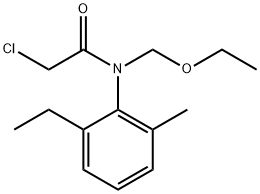34256-82-1

Product Name:
Acetochlor
Formula:
C14H20ClNO2
Synonyms:
2-Chloro-N-ethoxymethyl-N-(2′-ethyl-6′-methylphenyl) acetamide
Inquiry
CHEMICAL AND PHYSICAL PROPERTIES
| Physical Description | Light amber to violet oily liquid; [HSDB] Light yellow liquid; [MSDSonline] |
|---|---|
| Color/Form | Clear, viscous liquid |
| Odor | Aromatic odor |
| Boiling Point | BP: 172 °C at 5 mm Hg |
| Melting Point | 10.6 °C |
| Flash Point | >93 °C (tag closed cup) |
| Solubility | In water, 233 mg/L at 25 °C |
| Density | 1.136 g/mL at 20 °C; 1.107 g/mL at 25 °C; 1.1 g/mL at 30 °C |
| Vapor Pressure | 0.000028 [mmHg] |
| LogP | log Kow = 4.14 |
| Stability/Shelf Life | Stable for over 2 years at 20 °C (EC formulation) |
| Decomposition | When heated to decomposition it emits toxic vapors of /nitrogen oxides and hydrogen chloride/. |
| Corrosivity | Formulations are sightly corrosive to mild steel |
| Refractive Index | Index of refraction: 1.5272 at 20 °C/D |
| Collision Cross Section | 160.09 Ų [M+H]+ [CCS Type: DT, Method: stepped-field] |
| Kovats Retention Index | 1852 |
| Other Experimental Properties | Wine red to yellow or amber oil /Technical acetochlor/ |
| Chemical Classes | Pesticides -> Herbicides, Chloracetanilide |
SAFETY INFORMATION
| Signal word | Warning |
|---|---|
| Pictogram(s) |
 Exclamation Mark Irritant GHS07  Health Hazard GHS08  Environment GHS09 |
| GHS Hazard Statements |
H315:Skin corrosion/irritation H317:Sensitisation, Skin H332:Acute toxicity,inhalation H335:Specific target organ toxicity, single exposure;Respiratory tract irritation H351:Carcinogenicity H373:Specific target organ toxicity, repeated exposure H410:Hazardous to the aquatic environment, long-term hazard |
| Precautionary Statement Codes |
P202:Do not handle until all safety precautions have been read and understood. P273:Avoid release to the environment. P280:Wear protective gloves/protective clothing/eye protection/face protection. P302+P352:IF ON SKIN: wash with plenty of soap and water. P308+P313:IF exposed or concerned: Get medical advice/attention. |
COMPUTED DESCRIPTORS
| Molecular Weight | 269.77 g/mol |
|---|---|
| XLogP3 | 3.2 |
| Hydrogen Bond Donor Count | 0 |
| Hydrogen Bond Acceptor Count | 2 |
| Rotatable Bond Count | 6 |
| Exact Mass | 269.1182566 g/mol |
| Monoisotopic Mass | 269.1182566 g/mol |
| Topological Polar Surface Area | 29.5 Ų |
| Heavy Atom Count | 18 |
| Formal Charge | 0 |
| Complexity | 260 |
| Isotope Atom Count | 0 |
| Defined Atom Stereocenter Count | 0 |
| Undefined Atom Stereocenter Count | 0 |
| Defined Bond Stereocenter Count | 0 |
| Undefined Bond Stereocenter Count | 0 |
| Covalently-Bonded Unit Count | 1 |
| Compound Is Canonicalized | Yes |
PRODUCT INTRODUCTION
description
Acetochlor is a monocarboxylic acid amide that is N-phenylacetamide carrying an ethyl and a methyl group at positions 2 and 6 respectively on the benzene ring while one of the methyl hydrogens as well as the hydrogen attached to the nitrogen atom have been replaced by a chloro and an ethoxymethyl group respectively. It has a role as a herbicide, a xenobiotic and an environmental contaminant. It is a monocarboxylic acid amide, an organochlorine compound and an aromatic amide. It is functionally related to a N-phenylacetamide.